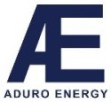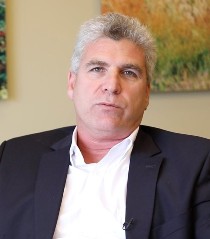
© CEOCFO Magazine -
CEOCFO Magazine,
Phone: 727-
Email: info@ceocfocontact.com


Search





Lynn Fosse, Senior Editor
Steve Alexander, Associate Editor
Bud Wayne, Editorial Executive
Christy Rivers -
Valerie Austin -




Revolutionary Environmentally Friendly Water-
 Ofer Vicus
Ofer Vicus
Chief Executive Office
Aduro Energy Inc
Contact:
+1 647 680 3515
Interview conducted by:
Lynn Fosse, Senior Editor
CEOCFO Magazine
Published – March 2, 2020
CEOCFO: Mr. Vicus, what is the idea behind Aduro Energy Inc?
Mr. Vicus: Aduro Energy was founded to creatively simplify the approaches to chemical processes that are traditionally complicated. The simplification makes them more efficient such that they dramatically reduce environmental and financial penalties typical in the chemical and petroleum industry today. The novel, water-
In our everyday experience with water, we know that water and oil do not mix. But at the temperatures we use for hydrothermal processing, things change. In fact, the chemical properties of water become quite different in certain beneficial ways. For example, it interacts with oil to a much greater extent. And a fact I think is most interesting is that neutral water is actually quite acidic under our hydrothermal conditions. Though water is still water, our understanding about these curious changes in its behavior allows us to promote certain desirable chemistries that normally do not occur, such as improving the structure of low-
CEOCFO: Has much research has been done using water in the way you are suggesting or is this a novel concept?
Mr. Vicus: The first related patent we identified dates back to 1938. In the intervening time, notably in the most recent decades, scientists and engineers at some of the largest players in the energy sector explored the possibility to somehow exploit water – and we studied their work. But we are particularly indebted to the late Professor Norbert Berkowitz of University of Alberta (Order of Canada), who went mining for new approaches and understanding. Continuing to dig were he did, we were able to unearth additional, critical insights buried beneath a mountain of existing ideas. Today a number of companies are doing the same, exploring other variations, which also seem to be promising.
CEOCFO: How did you come about looking at this concept? Did a light bulb go on one day?
Mr. Vicus: All of our understanding came gradually through years of risky, rolling research. Some of it yielded positive results that led in new, promising directions. And of course, some led into cul de sacs. We actually studied the science and technology in the field for almost three years prior to beginning actual research. Early on our ideas were dismissed as just the latest iteration of an old, unfruitful idea – a waste of more time and money. But we did not stop. And because of that, Anil and Marc did have a Eureka! moment in which the bulb suddenly got much, much brighter and illuminated the true potential of the technology (which still is under wraps).
What is simply lovely is how our work on two disparate chemical problems made the breakthrough possible. Our initial lessons about water-
CEOCFO: You have the Hydrothermal Upgrading technology (HTU) and the Thermo Catalytic De-
Mr. Vicus: The first thing to note is that Hydrothermal Upgrading is not a fixed technique. It is a general approach involving heat and water wherein we control particular process and chemistry variables to achieve desired chemical outcomes. With HTU, that means we can upgrade heavy oil under conditions that are far less severe than are typical in petroleum refining. Mainly, that means instead of hitting the oil with a thermal sledge hammer (high temperature), our approach employs “gentle persuasion” to get superior results at lower temperature (and lower energy consumption). Similarly, the TCD process is designed to promote specific reactions to obtain the product we want while preventing other, undesirable reactions that reduce the amount or quality of the product, or the efficiency of the process.
But if you think about it, oil sands bitumen in Alberta is quite different from making diesel from the corn oil byproduct from an ethanol plant in Iowa. We developed HTU as a greener way to improve the properties of heavy oil while TCD is for converting renewable vegetable oils into hydrocarbons just like those in refined petroleum products like diesel. Between the two, the chemical problem to be solved is very different. Yet in both processes, we put those unique, strange properties of water to work.
HTU development was motivated by a vision for a way to upgrade bitumen that was simpler, less expensive, and decentralized. By decentralized, I mean that the HTU process can be configured to operate efficiently on a relatively small scale. This contrasts the reality typical in petrochemical, which in turn allows geographically distributed deployment where the oil is produced. The problem with bitumen is that it is dense and thick compared with conventional, benchmark oils like Brent and West Texas Intermediate (WTI). And that is due to the relatively higher amounts of large molecules called asphaltenes. With the root of that word being “asphalt,” you can appreciate how the same properties that make them wonderful for paved roads complicate the transportation of heavy oils. Still worse, they stubbornly resist conversion to nice, light fuels. And as a consequence, bitumen-
Alberta bitumens may contain over 25% of asphaltenes and related materials, depending on how you draw the line. So, the idea with HTU is to take direct aim at those asphaltenes and break them into lighter materials, some even being in the diesel range. That allows us to turn bitumen into something much closer to conventional oil. The economics are quite impressive: a barrel of low-
Now let me comment briefly on our Thermo Catalytic De-
A feature of TCD that is unique and advantageous compared with alternatives is that just like HTU, it does not use hydrogen from an external source. An irony of certain “green” processes touted for producing renewable diesel and biojet fuel is that they rely on hydrogen from fossil fuel (natural gas). And whereas those other technologies generally resemble petrochemical processes that operate optimally on large scales, TCD shares the downward scalability of HTU, giving it distinct appeal for small and mid-
CEOCFO: Where are you in development and potential commercialization of your technologies?
Mr. Vicus: Both of the technologies are pilot ready. An sub-
CEOCFO: What has been the interest from people in the industry who are aware of what you are doing?
Mr. Vicus: It is overwhelming! Every single industry player we have engaged so far has been interested. I think they initially had low expectations, but when we pulled back the curtain their response is, “Wow, I didn’t see that coming – this is unique and potentially game-
CEOCFO: Are you seeking funding, partnerships or investment at this point?
Mr. Vicus: We welcome industry partners that may be interested to financially participate in our pilot program in exchange to some commercial benefits. And we are in the midst of closing our funding rounds. We also are open to collaborations with private, government, or academic research centers interested in participating in development of this incredible technology.
CEOCFO: How far will the current funding take you?
Mr. Vicus: We have high level of interest from industry partners, so we anticipate it will take us through the commercial demonstration phase and up to the second raise, which will take about 24-
Often, companies find themselves buried under the bills of an operating demo, but we believe that this is will not be our case. Because the technology has vast amount of processing flexibility, customers will want to investigate how it adapts to their particular feedstock and commercial needs. Therefore, our business model provides for price-
CEOCFO: What surprised you throughout this whole process of getting to this point at Aduro Energy? What was unexpected during the process?
Mr. Vicus: The discovery of the HTU potential was like trying to assess the size and shape of iceberg from its tip above the water. I never could have imagined that the technology would be so powerful and versatile. Follow-
Every company with a new technology likes to think theirs will be revolutionary, disruptive, game-
“Every single industry player we have engaged so far has been interested. I think they initially had low expectations, but when we pulled back the curtain their response is, “Wow, I didn’t see that coming – this is unique and potentially game-